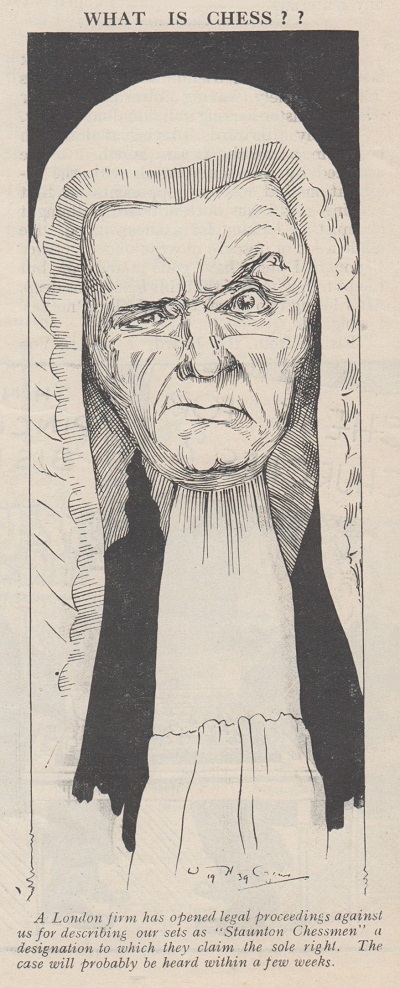
Edward Winter

Sketch by W.H. Cozens, CHESS, 14 April 1939, page 278
We present a chronological catalogue of chess-related cases which went to court. Information on other affairs will be much appreciated.
1888: Priscilla Horwitz v Charles Windust
From pages 78-79 of the International Chess Magazine, April 1888:
‘“Horwitz v Windust. 31 January, before Mr Justice Wills, Queen’s Bench Division. Mrs Horwitz, widow of the late B. Horwitz, sued Mr Charles Windust, a publican, proprietor of the Royal Mail public-house, Noble-street, City, to recover £45 under the following circumstances. It appeared that plaintiff was desirous of selling the copyright of her late husband’s work Chess Studies and End Games, with the stereotype plates belonging to it. She was introduced to defendant and, according to her case, he undertook to sell them for her. He succeeded in effecting a sale to Messrs Bell and Sons, publishers, for £75, and gave plaintiff £30, and she now claimed the balance, contending he acted as her agent. The defendant, on the other hand, said he was introduced to the plaintiff as one who would buy her book, and acted as principal throughout, buying the work absolutely for £30. In support of this he relied upon an agreement signed by him to the effect that he would give her £30, free from all expense, for the book. Defendant also said he paid £5 for the introduction to plaintiff, and had incurred some expense in finding a purchaser and in running down to Brighton to see plaintiff, who was visiting there. Mr Hextall appeared for the plaintiff, and Mr Lyon for the defendant. His Lordship came to the conclusion from the plaintiff’s evidence, which was corroborated, that at the outset the defendant undertook to sell the book for the plaintiff, and a man could not change himself from an agent to a principal without giving the other side full knowledge of the change of circumstances, which in this case had not been given. The defendant evidently did not understand what the doctrines were upon which in a court of law or equity a question of this kind must turn, and he was sure his moral perceptions unaided would scarcely lead him in that direction. He must therefore give judgment for the plaintiff for £45. Mr Lyon pointed out that the defendant had been put to some expense. His Lordship said he would enter the judgment for £40 on that ground.” – Liverpool Courrier.’
1889: Frederick Lloyd (‘Frederick Staunton’/‘Frederick Stanton’)
Hans Renette (Bierbeek, Belgium) has found on page 2 of the Standard (London), 2 April 1889 a report about an accusation of fraud against Frederick Lloyd (‘Frederick Staunton’/‘Frederick Stanton’), who claimed to be Howard Staunton’s nephew:
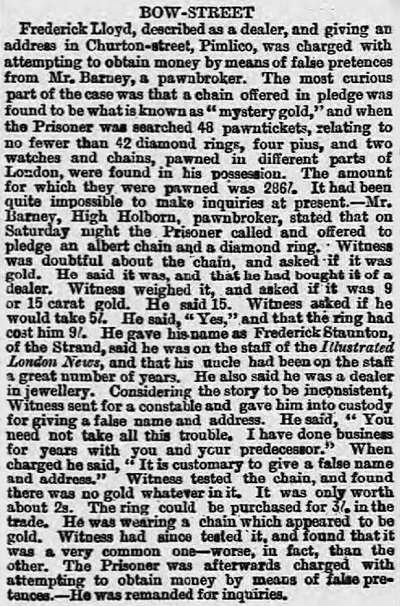
Our correspondent notes that further information is available on the website The Proceedings of the Old Bailey.
(9474)
John Townsend (Wokingham, England) reports that in the London Gazette of 3 February 1891 (‘The Bankruptcy Acts, 1883 and 1890. Receiving Orders’) there was an entry under ‘Debtor’s Name’ for Frederick Charles Howard Staunton. The column headed ‘Address’ had the following:
‘Lately residing at 5 Churton-street, Pimlico, Middlesex, present place of residence the Petitioning Creditor has been unable to ascertain.’
The same street was mentioned in the news report shown in C.N. 9474.
(9496)
1890: Isidor Gunsberg v Volksblatt + Francis Joseph Lee v Isidor Gunsberg (C.N. 1078)
The September 1890 International Chess Magazine, pages 273-274, had a letter from Gunsberg to Steinitz explaining the details of ‘the first chess libel suit on record’. The Vienna paper Volksblatt was found guilty and fined for publishing a ‘libelous paragraph’ about the abortive Chigorin-Gunsberg match. According to Gunsberg, Chigorin suppressed the correct facts of the match negotiations and a false insinuation was taken up by the Austrian journal.
The following issue, pages 299-300, featured information on another chess legal case. Again Gunsberg was involved, although this time as the defendant. Francis Joseph Lee – and this is the only time we have ever seen his forenames in full in a contemporary source – sought leave to commence proceedings for libel against the editor and publisher of the Evening News and Post and its chess columnist, Gunsberg. The latter had allegedly ‘imputed or suggested a corrupt motive to Mr Lee in losing to Mr Mason a game in the Manchester Chess Tournament’. Gunsberg denied that he had imputed or suggested anything of the kind. ‘The learned Judge refused to make an order giving leave to prosecute.’
Steinitz commented:
‘In both cases Mr Gunsberg was successful, and we thoroughly sympathized with him in the first case, but cannot do so in the present instance. Mr Lee’s cause of complaint may not have been so strong as to warrant a legal prosecution, but it is to be regretted that even the slightest hint of professional dishonesty should have been given in a chess column, edited by a professional master, without the accusation being capable of absolute proof.’
From page 227 of the Chess Player’s Chronicle, 18 October 1890:
‘The unpleasantness so long existing between various of the professionals in the chess world has recently reached a climax hitherto unknown, we think, in the history of the game. Certain remarks of Mr Gunsberg’s, in his column in the Evening News and Post, having given offence to Mr F.J. Lee, that gentleman has sought redress in legal proceedings, and an application was made on Thursday, to the Vacation Judge in Chambers, for leave to commence proceedings for libel, against the editor and publisher of the Evening News, and Mr I. Gunsberg as conductor of its chess column. The learned Judge refused to make an order giving leave to prosecute.’
1898-99: Samuel Rosenthal v Prince Balaschoff (C.N. 1483)
‘From the Stratégie we learn that a curious lawsuit has just been brought before the First Chamber of the Civil Tribunal at Paris. A dozen years ago Prince Balaschoff engaged Mr Rosenthal as a teacher of chess, at a salary of 500 fr. per month, and 1,000 fr. when M. Rosenthal accompanied his pupil in travel. Pupil and teacher were on the best of terms, and they laboured together hard at a work on chess. But one gets tired of everything, and some months ago M. Balaschoff got rid of his instructor. The latter brought an action to recover 15,000 fr. arrears of pay according to agreements, 1,000 fr. for the last journey to Stuttgard [sic], and 25,000 fr. indemnity for sudden dismissal, and for loss of profits by non-publication of the chess work on which they had been engaged. The tribunal awarded M. Rosenthal 15,000 fr. for salary according to agreements, but rejected all his other demands.’
Source: BCM, March 1899, page 112. The French magazine’s report appeared on pages 20-21 of its 15 January 1899 issue. Different figures are given on page 285 of the Companion.
From Ken Whyld (Caistor, England):
‘We took our figures from the admirable Chicco and Porreca book, but I suspect that we were, for once, let down. The BCM figures look much more plausible. I guess now that if we saw the latter we did not give sufficient attention to spot the difference.’
(1505)
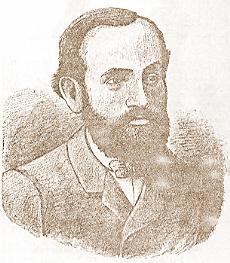
Samuel Rosenthal
1906: BCM v Harold H. Cudmore
The January 1906 issue of Lasker’s Chess Magazine published a fictional/satirical article by Harold H. Cudmore entitled ‘A Method (Possibly an English one) of Conducting a Problem Tourney’. The BCM considered that it ‘conveys serious innuendos, and suggests deliberate and systematic fraud in the methods employed by English conductors of problem competitions’, and the BCM also used such terms as ‘cowardly attack’, ‘sorry stuff’, ‘most despicable’ and ‘a libel upon the honesty of English chess editors (and especially ourselves)’. The BCM also stated:
‘... Mr Harold H. Cudmore was asked for a reasonable retraction; as he refused there was no option but to invoke the aid of the law. Writ and Statement of Claim did not melt the Defendant’s determination to resist ...’
The magazine noted, however, that Cudmore subsequently (on 23 July 1906) signed a memorandum of apology and paid the plaintiff’s costs. Lasker’s Chess Magazine also published the memorandum and expressed ‘our regret for the unjust charges brought against Mr Laws [the Problem Editor of the BCM]’.
Sources: Lasker’s Chess Magazine: January 1906, pages
138-140 and 144 and June 1906, page 94.
BCM: May 1906, pages 181-186, August 1906, pages 317-318,
and October 1906, page 389.
1914: Spero v Pease
Under the heading ‘Chessmen in Court’ page 345 of the Chess Amateur, September 1914 related a case recently heard in the King’s Bench Division over Spero’s sale to Pease of an antique box of games, including a set of chessmen. ‘Judgment for plaintiff [Spero] for £48.’
1915: Siegbert Tarrasch v DeutschesWochenschach (C.N. 1483)
‘Deutsches Wochenschach of Berlin has been sued by Dr Tarrasch for reprinting the game between Dr Tarrasch and Walbrodt, which the former had annotated for a Norwegian paper. H. Ranneforth, the editor, explains in a recent issue of the German weekly that this particular game had been reprinted at the request of A. Lindström, chess editor of the paper referred to. The suit in question is a decidedly novel one and the outcome will be awaited with keen interest on the part of chess players everywhere and especially so by chess writers.’
Source: American Chess Bulletin, November 1915, page 219.
This account was based on what appeared on page 266 of Deutsches Wochenschach, 19 September 1915. On page 358 (19 December 1915 issue) the German magazine reported, ‘Das daraufhin eingeleitete Vorverfahren ist von der Staatsanwaltschaft jetzt eingestellt worden’, and we shall be grateful if a reader can clarify exactly how the case eventually ended.
1916: Charles Jaffe v Hartwig Cassel (C.N. 1105)
From the BCM, June 1916, page 200:
‘When chessplayers go to law on some matter connected with the game, there is usually a touch of the ridiculous. In the Bronx Municipal Court, on 4 April, a case came up in which Charles Jaffe sued Hartwig Cassel, one of the editors of the American Chess Bulletin, for $700 – over £140 – for work alleged to have been done in analysing the Rice Gambit. Last year Professor Isaac J. [sic – L. would be correct] Rice invited a number of strong American players to Utica to test his gambit once more, and it was agreed that their investigations should be continued. Jaffe, however, broke away from the rest and decided to analyse by himself. The others concluded their joint work, which is to appear in a book entitled Twenty Years of the Rice Gambit, while Mr Julius Finn, who was appointed referee in the matter, declared Jaffe’s work not acceptable. Hence the lawsuit, Mr Cassel being brought in as having acted in an advisory capacity for the late professor in chess matters. The witnesses at the trial included Marshall (who considered Jaffe’s claim not unreasonable), Julius Finn, Albert B. Hodges, and J. Rosenthal. The verdict was in favour of Mr Cassel. The chief amusement seems to have been when Jaffe was in the witness-box on his own behalf, and expressed his opinion of the chess strength of a number of noted players in the court – not unqualified by their attitude towards him in the case.’
An endnote on page 262 of Chess Explorations mentioned that the BCM misspelled Cassel’s name ‘Cassell’ throughout. A detailed account of the legal case appeared on pages 124-125 of the May-June 1916 American Chess Bulletin. See too C.N. 3756.
1916: Isidor Arthur Gunsberg v Alfred William Foster (C.N.s 360 & 3824)
In his chess column on page 4 of the (London) Daily Telegraph of 26 June 1915 Gunsberg wrote:
‘The Hostile Series. Neither Huxley nor Todhunter, though they have learnedly dealt with the average run of chances, have done sufficient justice to the problem of the hostile series. The subject is worthy of the attention of mathematicians and philosophers. Instinct is very often a more unfailing guide than the mathematician or philosopher can be. The bridge player, or any other player for the matter of that, who ceases to play when he thinks the hostile series is approaching does the right thing. At the moment we have the feeling that we are the victim of a hostile series affecting our problems. Why it should be that for many months we may not have an unsound problem, and that all at once a series of second solutions should crop up, we cannot explain, except on grounds of a regular occurrence of hostile series.’
A week later, on page 4 of the Evening News of 3 July 1915, the chess column (‘by the Chess News Agency’) included the following paragraph until the heading ‘The Hostile Series’:
‘A wonderful excuse for making blunders has been evolved by one sapient scribe of the chess world. Apparently he has been publishing more unsound problems than usual, as nearly every problem which has appeared in his column for some time has had at least two solutions; and he moralises thus: “At the moment we have the feeling that we are the victims of a hostile series affecting our problems. Why it should be that all at once a series of second solutions should crop up we cannot explain.”’
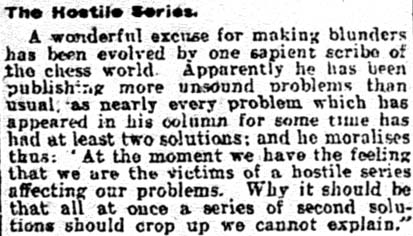
The author of those words was A.W. Foster, and Gunsberg sued for libel. When the case came to court at the end of the following year the Evening News of 8 December 1916 reported:
‘The defence denied that the words in question were libellous. Justification and fair comment were also pleaded.
... A long list of newspapers for which Mr Gunsberg had acted as chess editor was given by counsel
... Mr Mayer [Sylvain Mayer, K.C., counsel for the plaintiff] then pointed out that extra marks were given by Mr Gunsberg to solvers who found two solutions to a problem in the Daily Telegraph.
It was impossible – said counsel – to avoid giving problems with two solutions occasionally. A second solution to a magnificent problem by Mr Blackburne was found 42 years after it was published.
In 1915 the proportion of problems in the Daily Telegraph with two solutions was not abnormal. There were three cases of misprints.
Counsel complained that in the passage quoted from the Daily Telegraph the words “For many months we have not had an unsound problem” were omitted.
Mr Gunsberg, giving evidence, said that the proportion of unsound problems given in certain other newspapers was greater than that in the Daily Telegraph.
Mr Hume Williams, cross-examining, asked the witness if eight out of 11 problems that appeared in a certain period were not unsound.
The witness replied that three misprints were included.
With regard to a misprinted problem, the judge asked why a white pawn should not have been a white knight.
Mr Hume Williams: “Your lordship must be careful; you shock the chess experts.”
Mr Gunsberg agreed that “a hostile series” meant a run of bad luck. He had experienced such things at Monte Carlo.
Mr Williams: “You don’t shock me, Mr Gunsberg, but you may shock the chess experts. (Laughter.)
The witness explained that his bad luck was that the unsound problems came together in a bunch.
Replying to a question, the witness said that nobody could guarantee the soundness of a chess problem ...’
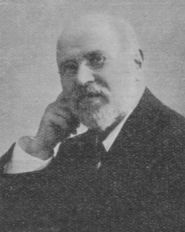
Isidor Arthur Gunsberg
The Times of 9 December 1916 also reported the case:
‘Counsel, referring to the alleged libel, contended that Mr Gunsberg had made no blunders. The occasional publication of problems with two solutions could not be avoided.
The plaintiff, in evidence, denied that he had committed blunders. Problems had sometimes been published which had no solution at all. They afforded just as much amusement as those which had solutions.
Mr Hume Williams: “They must last longer any way.” (Laughter.)
Mr Benjamin Glover Laws, the editor of the problem department of the British Chess Magazine, said that he had always had a very high opinion of Mr Gunsberg. It took months, and in some cases years, to construct a problem and many days properly to analyse it in order to detect flaws. A prize problem was often examined by hundreds of persons. Some prize problems, although composed by eminent composers, had been found to be unsound after many years. It was impossible to avoid such a thing.
Mr Justice Bray: “It is just like a Judge’s making a mistake in law. You don’t call that a blunder.” (Laughter.)’
The following report was published in the Evening News of 12 December 1916:
‘The action in which Mr Isidor Arthur Gunsberg, the chess master and chess journalist, is asking for damages for libel against the Associated Newspapers, Ltd., and the Chess News Agency was continued before Mr Justice Bray and a special jury today.
... The effect of the paragraph [in the Evening News] was that recently published problems were “more unsound than usual” and it is stated by the defence that eight out of the 12 problems had two solutions.
Mr Gunsberg agrees that problems with two solutions were published. He contends that the average percentage of unsound problems published by him is less than normal, and that it is impossible to guarantee the soundness of a problem.
Mr A. Guest, a well-known player and problem composer, was called as a witness for Mr Gunsberg. He has been chess editor of the Morning Post for 33 years.
This witness said that in spite of the care devoted to the matter he had had 21 unsound problems out of 260 in his column during the past five years.
The word “blunder” had been used in the Evening News paragraph.
Replying to counsel, Mr Guest said that he did not consider that “eight oversights spelled one blunder”.
Mr J.H. Blackburne, the veteran British champion, winner of many international tournaments was the next witness. He is now 77 [sic] years old. He had known Mr Gunsberg – said he – for 50 years.
Mr Blackburne told the court that he did not think it was a blunder to publish problems with two solutions, as he had done the same thing himself.
He recalled a problem that he composed and published in 1847 [sic]. It was examined by five experts including himself, for days and was passed as sound. Two years ago “some Argus-eyed individual in Devonshire” discovered a second solution.
Mr Hume Williams, K.C. (for the defendants): “It had a long though unsound life.” (Laughter.)
Mr Hume Williams asked if it would not point to carelessness if the second solution were easily discoverable.
Mr Blackburne replied that he had not examined the problems in question. The second solutions, or cooks, were usually more difficult to find than the intended solutions.
Opening the case for the defendants, Mr Hume Williams said Mr Gunsberg had not suffered one farthing damage by what was published.
He had himself, in the Daily Telegraph, spoken of the second solutions, and attributed them to a hostile series of bad luck against him.
Mr Hume Williams spoke of the unsound positions in detail. He asked Mr Herbert Jacobs, a distinguished player, who was appearing with Mr Mayer, K.C. on the other side, whether a “rook” was not the same thing as a knight.
Mr Jacobs: “A rook is a castle.”
The Judge: “Do you really pretend, Mr Hume Williams, that you do not know?”
Mr Hume Williams: “Your lordship must not say ‘pretend’. I shall bring an action against your Lordship.” (Laughter.)
Mr A.W. Foster, the writer of the paragraph, said it was supplied to the Evening News by the Chess News Agency.
The witness said he had combined the distinction of being president of the Cambridge University Chess Club with being vice-president of the Oxford University Club.
“I was amused and surprised”, said Mr Foster, “to find that a chess expert should regard chess as being on a level with a game of chance.”
The Judge: “You were shocked?”
Mr Foster: “My chess conscience was shocked.”
The witness then said he had no malicious feeling towards Mr Gunsberg. He was merely poking a little mild fun at him without mentioning his name.
The witness pointed out that four of the eight unsound problems in question were two-movers and four three-movers. A second solution in a two-mover should be easily detected.
Cross-examining, Mr Mayer pointed out that early in the year The Field published unsound problems on three successive weeks.
The Judge: “Which is the bigger man, the chessplayer or the problem expert?”
Mr Foster: “The type of men is entirely different.”’
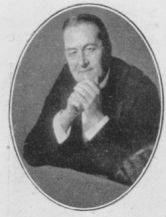
Alfred William Foster
A similar account of the proceedings was published in The Times of 13 December 1916, which, however, gave 1874, rather than the impossible 1847, in the account of Blackburne’s evidence and added the following details:
‘Mr A.W. Foster ... believed that the plaintiff had made a blunder and had evolved a very clever excuse. He imputed carelessness.
Cross-examined by Mr Sylvain Mayer. He could not say if 16 out of 77 problems published in the British Chess Magazine were unsound. He was acquainted with Grimshaw’s famous problem published for 20 years in every country before a second solution was discovered. He had never himself composed or published a problem and was not a chess master.
His use of the words “sapient scribe” of the plaintiff was sarcastic, and he was quite content to be classed by Carlyle with ironical people as a “pest of society”. Carlyle had also said that the 40 millions were mostly fools.
Mr Tinsley said that for 10½ years he was chess editor of The Times, which was then the leading newspaper for problems. His percentage on 3,000 problems over this period was 5% unsound. That eight out of 12 should prove unsound could be due only to carelessness in scrutinizing them.
Cross-examined by Mr Mayer. He once published a hostile American series, in which the percentage of unsound problems was from 10 to 15.’
The verdict was announced in, inter alia, the Daily Telegraph of 13 December 1916:
‘Gunsberg v Associated Newspapers (Ltd.) and Another. After an hour’s deliberation in private the jury awarded plaintiff in this suit, Mr Isidor Arthur Gunsberg, chess master and chess journalist, £250 damages for libel.’
That was quite a windfall, and our account concludes with a reminiscence by C.S. Kipping on page 87 of the January 1950 CHESS:
‘The great master I. Gunsberg never claimed to know much about problems but brought an action for libel some 30 years ago when someone published derogatory remarks in the press. When next we saw him after the verdict he rubbed his hands together and hoped someone else would libel him, since he was provided with housekeeping money for some years.’
1921: William Winter (C.N. 1072)
William R. Hartston (Cambridge, England) submitted the following from the London Evening News of 5 December 1921:
A child chess prodigy, William Winter, known afterwards to the police as “a Simple Simon among the Communists” appealed today against a six months’ sentence at Bristol for seditious speeches.
He was described as an international chess player and a student of Cambridge University.
Mr H.S. Diamond, on his behalf, said he could not really appeal against the conviction, as there was evidence that he uttered the speeches.
During the war, he said, Winter was in the Honourable Artillery Company, being discharged with a good character. He seemed to have left his studies at Cambridge to air his extreme Socialistic views and join the Communist ranks.
It was said that he was under the influence of a woman older than himself.
While he did not suggest that chessplayers all become weak in the head, he submitted that in this case the man’s brain was weakened. A term of imprisonment might have a severe effect on him.
Mr Justice Branson said no fault could be found with the trial. This young man left his studies and employment to stir up strife among those less fortunate than himself.
The sentence was not too severe, for those who made such seditious speeches inflamed and perverted many people. The appeal was dismissed.’
1922: Samuel Reshevsky (C.N. 742)
A report on pages 16-17 of the January 1923 BCM:
‘The Reschefski [Reshevsky] case was decided at the Children’s Court, Manhattan, on 15 November, when a motion for the dismissal of the case was granted, on the ground that the charge of improper guardianship had not been sustained. The evidence for the prosecution was insufficient, in the judge’s opinion, to show that the boy’s health or morals were in danger of being impaired; and testimony as to his education at the Rabbinical School, East Broadway, was put in by the defence. The Brooklyn Eagle says: “After dismissing the case, Judge Levy recommended that, in order to prevent undue exploitation of Sammy’s remarkable powers, someone outside of the immediate family be designated to act as sponsor and make occasional reports to the court concerning his progress. This Assemblyman Perlman undertook to do in behalf of Sammy, who went home with his parents, delighted over the outcome of this, his first court experience.”’
From page 206 of the April 1928 Chess Amateur:
‘Aaron Sayers, aged 53, with no means of support, but with a passion for chess, and alleged to be known in Ireland as a champion chessplayer, was brought before the magistrate at Bow Street Police Court on 15 March, accused of obtaining credit by fraud at a tea-shop. The five nephews who were not aware of his destitute condition heard of the charge and at once rallied round him. The magistrate placed him on probation for 12 months.’
Two contemporary newspaper reports on the ‘teashop chess champion’ from Ireland:
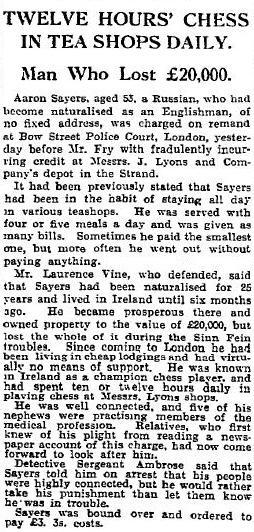
Manchester Guardian, 16 March 1928, page 11
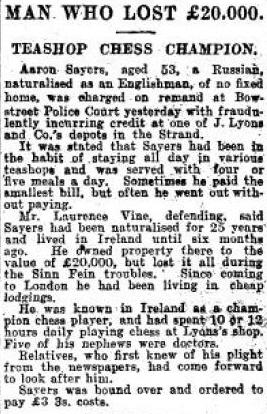
Daily Mail, 16 March 1928, page 7.
Regarding Sayers, see also C.N. 8417.
1933: Frank Taylor (C.N. 1483)
‘In reference to the Knightlights Club, vide the January BCM, Mr Herbert Jacobs quotes a most interesting letter from Mr Frank H. Taylor of Philadelphia, respecting a legacy of £100 left for the Franklin Chess Club of the Quaker City. It appears that under the laws of Pennsylvania the Court was about to make the bequest null and void because the gift did not contribute to the advance of literature. To rebut the arguments Mr Walter Penn Shipley, a noted lawyer of Philadelphia and of international chess reputation, took up the case.
The wind-up of Mr Shipley’s brief was a translation of a Persian poem ending as follows:
In concluding his letter Mr Taylor says: “At the age of 77 I find the last two lines are true and, when I saw Shipley last, which was quite recently, no objection had been filed.” – Yorkshire Observer Budget.’
Source: American Chess Bulletin, November 1933, page 164.
1938: Ernst Klein (C.N. 1602)
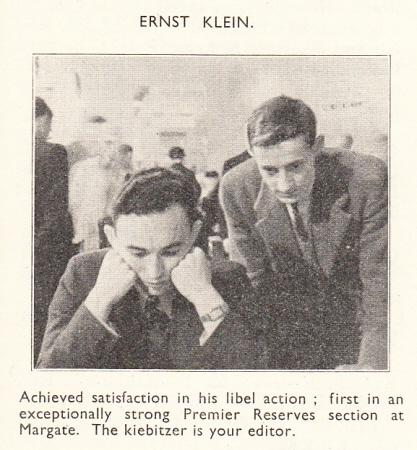
A photograph caption on page 361 of CHESS, 14 June 1938 described Ernst Klein as having ‘achieved satisfaction in his libel action’, and the April 1940 issue of the same magazine (page 168) referred back to this matter:
‘One hundred years ago, chess masters used freely to print things about each other which would lead to an instant and successful libel action today. E. Klein, the ex-Austrian master, entered on such an action when most of the visiting chess masters at Margate, a couple of years ago, signed and published a petition complaining about his “unfair and obnoxious behaviour” and stating their unwillingness to have him competing with them ever again; and he obtained redress.’
The matter had been mentioned on page 269 of the 14 April 1938 CHESS, under the heading ‘Klein’s “Honour Vindicated”’:
‘Ernst Klein has withdrawn his libel action against Alekhine, Miss Menchik, Prins and a group of other masters, having obtained an apology, with indemnification for costs. He states that his “honour has now been vindicated”.’
An endnote on page 262 of Chess Explorations:
Pages 78-79 of CHESS, 14 November 1937 reported: ‘A writ claiming damages for alleged libel has been issued by Ernst Klein, the Austrian chess master now living at Clanricarde Gardens, Bayswater, against Dr Alekhine, Miss Menchik, G. Koltanowski, E. Cox, L. Prins, Reuben Fine, W.A.T. Schelfthout, S. Landau and G. van Doesburgh. ... The action is concerned with a document prepared at Margate during the Easter congress in which certain allegations were made concerning Mr Klein’s desirability as an opponent.’
1939: Baruch Harold Wood v Jaques (C.N. 360)
In 1939 B.H. Wood found himself in the dock for having advertised for sale in CHESS in 1937 ‘genuine Staunton chessmen’ (see C.N.s 3653 and 3656). The plaintiffs were John Jaques & Son, Ltd., and Sir George Thomas, Max Euwe and Lodewijk Prins appeared as witnesses for the defence. The case is referred to by Fred Wren in his article ‘Tales of a Woodpusher: Woodpusher’s Woodpile’, which appeared in Chess Review, 1949 and was reprinted in Reinfeld’s The Treasury of Chess Lore (New York, 1951). The issues of CHESS of the time also contained a huge amount of material on the case. The decision was that ‘Staunton’ alone was a permissible description, but that the phrase ‘genuine Staunton’ implied a product made by Jaques & Son, Ltd., as opposed to any Staunton pattern. However, B.H.Wood appealed and, in 1940, won.
1944: Dupree’s Trusts, Daley and Others v Lloyds Bank, Limited and Others (C.N. 360)
Page 182 of CHESS, 28 March 1963 had a filler paragraph of legalese:

The question arising in this case was whether chess was of sufficient educational value for a gift to encourage chessplaying to qualify as a valid charitable gift. The verdict was yes, whilst acknowledging that the whole affair was rather a slippery slope: ‘If chess, why not draughts: if draughts, why not bezique, and so on, through to bridge, whist, and, by another route, stamp collecting and the acquisition of birds’ eggs?’, concluded J. Vaisey of the Chancery Division. This affair was brought to our attention by Paul Timson (Whalley, England), who provided a copy of the judgment.
Below, from our correspondence file, is the full text forwarded by Mr Timson in 1983 (pages 443-445 of the All England Law Reports Annotated, volume 2, 18 November 1944). The text quoted, not quite accurately, by CHESS is on page 444.
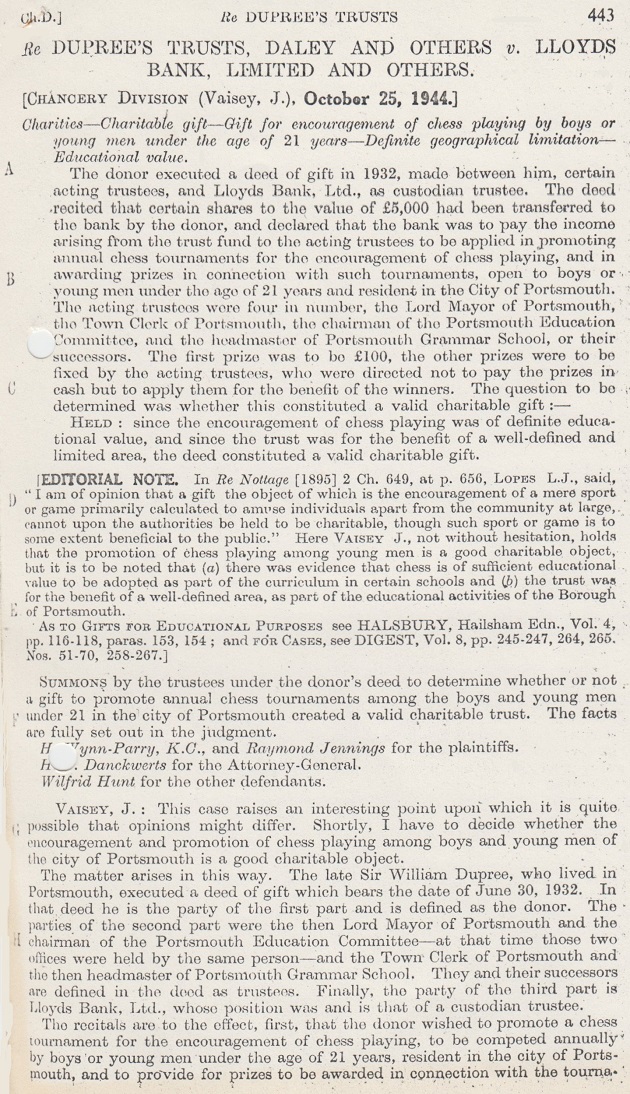
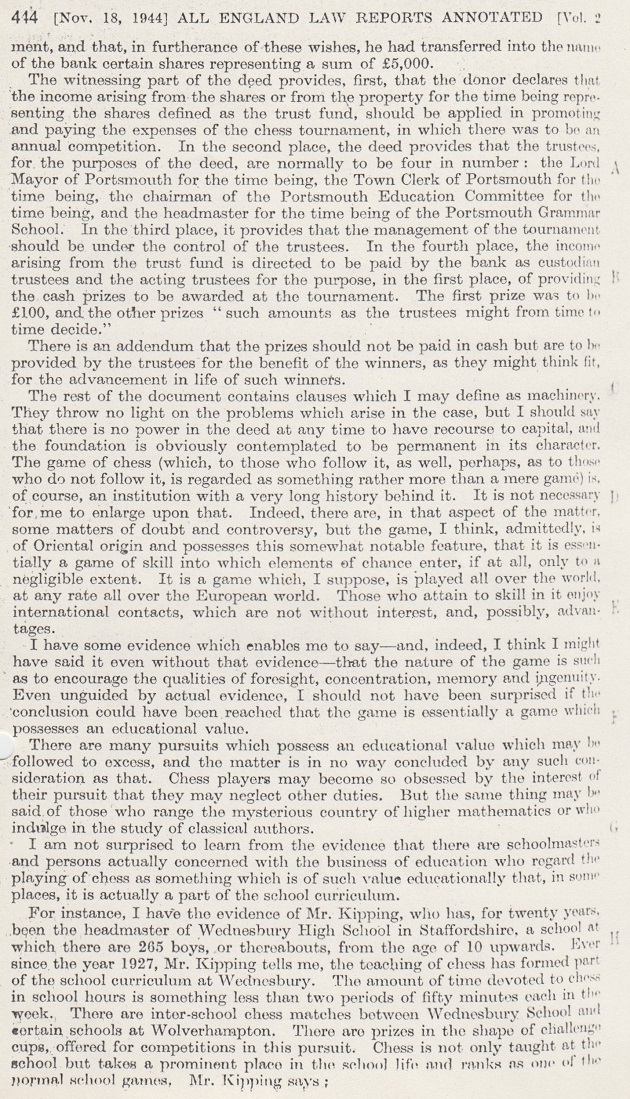
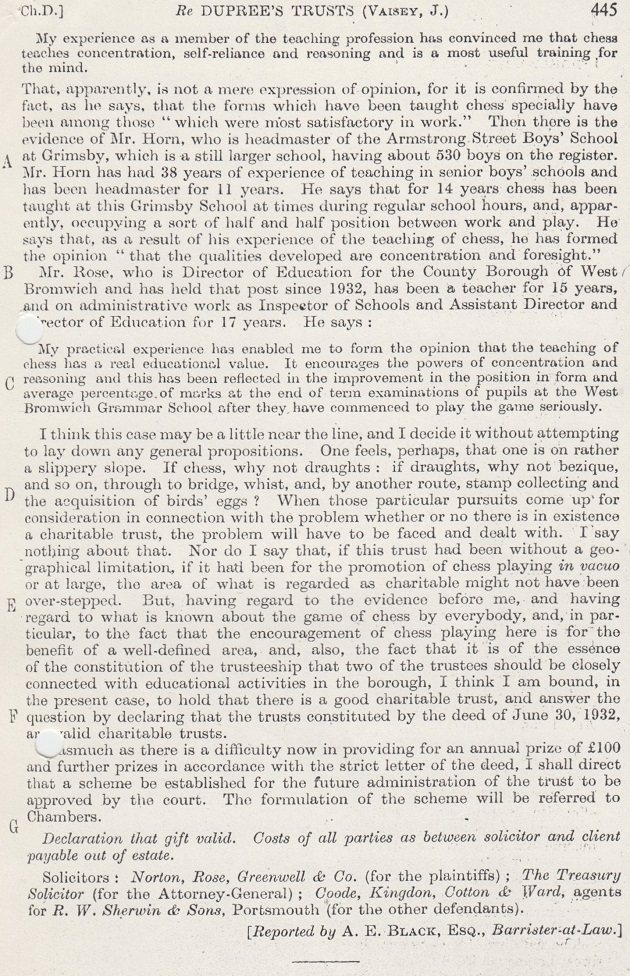
(11051)
1954: Baruch Harold Wood v William Ritson Morry (C.N.s 2569, 6724, 6733 & 6736)
From page 161 of CHESS, August 1954:
‘Chess Criminal Charge
B.H. Wood was acquitted at Birmingham Assizes on 14 July, without calling upon any evidence, of a charge of criminal libel instituted by W. Ritson Morry. In a letter to a Mr Golding, Mr Wood had indicated that if Mr Morry was in the new Welsh Chess Union, Mr Wood was out; he referred to Mr Morry as “this ex-gaolbird”. It was held that Mr Wood was entitled to give his reasons for withdrawing; that the description was true, as Morry, after misappropriating clients’ money as a Solicitor some years before, had been sentenced to 18 months’ imprisonment.
The Commissioner stated that in his opinion the case should never have been brought, and awarded B.H. Wood costs not exceeding £100.’
(2569)
James Plaskett (Cartagena, Spain) asks whether further details are available on Ritson Morry’s offence.
We note from Google Books (snippets shown by a search for ‘Ritson Morry’ and ‘solicitor’) that 1940s law reports had information on the case. Could a reader with access to the documents supply an account of the proceedings?
(6724)
David McAlister (Hillsborough, Northern Ireland) inform us:
‘There are a number of Law Reports on the criminal proceedings brought against Ritson Morry. However, they all report not the trial itself but his unsuccessful appeal against conviction heard by the Court of Criminal Appeal on 29 October 1945. His grounds of appeal were essentially concerned with legal technicalities, and the judgment of the three-judge Court of Criminal Appeal (delivered by Mr Justice Hilbery) does not go into details about the criminal charges which Morry faced. It merely states:
This passage appears on page 633 of Volume 2 of the All England Reports for 1945. The complete report is on pages 632-636 and was cited by lawyers as R. v Morry [1945] 2 All ER 632.’“At the summer assizes at Birmingham, on 26 July 1945, the appellant was tried on an indictment containing four counts charging him with fraudulent conversion of four sums of money totalling £3,136. He was convicted on all counts, and sentenced to 18 months’ imprisonment.”
(6733)
Paul Timson (Whalley, England) provides further details:
‘As mentioned by David McAlister in C.N. 6733, the only references to Ritson Morry in the Law Reports relate to a decision of the Court of Criminal Appeal on 29 October 1945, before Hilbery, Wrottesley and Stable, the appeal being based on technical legal grounds. I offer a summary below.
At the summer assizes at Birmingham on 25-26 July 1945 the appellant, William Ritson Morry, a solicitor, was tried on an indictment containing four counts charging him with fraudulent conversion of four sums of money totalling £3,136. He was convicted on all counts and sentenced to 18 months’ imprisonment.
He appealed against his conviction on a number of technical legal grounds and represented himself at the Court of Criminal Appeal.
One of the grounds of appeal was that when he was committed for trial by the magistrates’ court the magistrates, as they were obliged to do, asked him the question laid down by statute: “Do you wish to say anything in answer to the charge? You are not obliged to say anything unless you desire to do so, but whatever you say will be taken down in writing and may be given in evidence upon your trial.”
In response to that question he took the opportunity to make a speech, lasting some three hours, as an advocate on his own behalf. He now appealed on the grounds that because every word of his speech was not taken down and certified, the committal was irregular and the whole indictment should have been quashed.
The Court of Criminal Appeal held that the procedure of calling upon the accused to make a statement if he chooses at that stage in the proceedings, where the magistrates are considering whether or not a case is made out for committal, was never intended to apply to a man making an oration as an advocate on his own behalf. They therefore dismissed this ground of appeal.
Another ground of appeal was that the magistrates had refused to commit him for trial on the charges which were the subject of counts one and two in the indictment. The trial judge had, however, decided that these counts should be included in the trial, as well as counts three and four (on which the magistrates had committed him), and the appellant was duly convicted on all four counts.
The Court of Criminal Appeal held that this was a matter for the trial judge to decide, and his decision could not be questioned.
The appeal was therefore dismissed, and the Court held that the sentence of 18 months’ imprisonment would run from the date of conviction, namely from the first day of the assizes (25 July 1945).
The Wood v Ritson Morry case was reported in the Times newspaper on 7 April 1954, when B.H. Wood was committed for trial, and on 15 July 1954, when he was acquitted on the charge of criminal libel.
The offending paragraph of Wood’s letter to Henry Golding, dated 23 February 1954, was quoted by the Times:
“Your whole attitude makes it clear that you are a Morry stooge. When you have become in due time disillusioned about this ex-gaolbird and have returned to sanity please contact me again unless you are so fed up that you drop out of chess altogether as some have done.”
The 7 April 1954 report in the Times stated:
“Mr Morry said that at one time he practised at Sutton as a solicitor. ‘I fell on evil times, however, and was sentenced to 18 months’ imprisonment for fraudulent conversion, which I served and returned to public life’, he said. He had put himself at right with the world and was entitled to live at peace with it. The use of the expression ‘ex-gaolbird’ with its highly defamatory meaning was in itself sufficient to maintain a conviction for criminal libel, submitted Mr Morry.”
That report also quoted two officials of the British Chess Federation, Sir Leonard Swinnerton Dyer and George Wheatcroft, as stating that they were aware of Morry’s past conviction but had had no objection to his holding office in the Federation.
From personal knowledge I can give a fuller answer to James Plaskett’s question in C.N. 6724. I studied law at Birmingham University from 1965 to 1968 and whilst there I played in the Birmingham chess league at a time when B.H. Wood and W. Ritson Morry (both also graduates of Birmingham University) were still playing in the league. I had several long conversations with Wood, who was President of the University Chess Club and, as I recall, it was he who told me the story of Ritson Morry’s downfall. In the late 1930s Ritson Morry, who was a solicitor, invested clients’ money without their knowledge or consent in a speculative property development. He was convinced that the development would make a large profit and he would be able to replace the clients’ money and take the profit for himself. Unfortunately for Ritson Morry, with the outbreak of the Second World War the development collapsed and he lost all the money which had been invested. As he was unable to replace his clients’ money from his own resources, they reported the matter to the police as soon as they became aware of the situation, and this resulted in his eventual conviction and imprisonment, and also in his being struck off the roll of solicitors.
He did eventually repay the money.’
The photograph below (showing the English players who went to Holland to play a Dutch team) comes from page 296 of the June 1937 BCM:
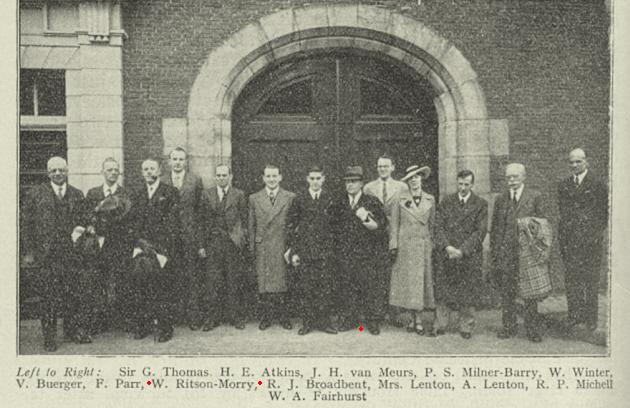
(6736)
Below is the sequence of reports published in the Times, 7 April 1954, page 3; 14 July 1954, page 5; 15 July 1954, page 5:

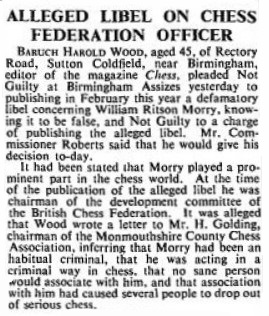
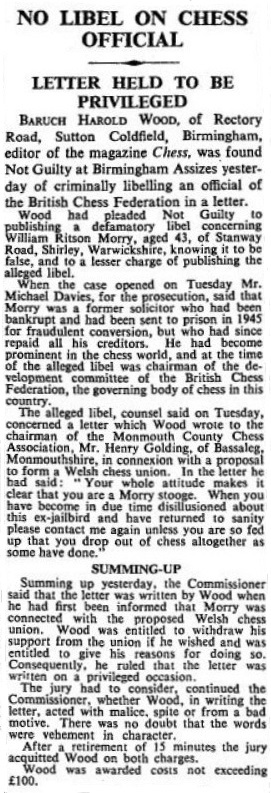
1957: A.E. Nield v Hastings & St Leonards Chess Club (C.N. 1483)
A.E. Nield claimed damages at Hastings County Court against officials of the Hastings & St Leonards Chess Club, from which he had been expelled. He asked for a declaration to clear his name. He had joined the club in 1951 as a country (as opposed to resident) member, but was informed on 28 March 1955 that because of his extensive use of club facilities he would have to pay the full membership fee, 30 shillings. Nield refused and was expelled. He won his case and was awarded £10 damages.
Full coverage of the case appeared in CHESS, 20 July 1957, page 246, and 20 August 1957, page 278.
[CHESS referred to the ‘Hastings Chess Club’, but on 28 June 2007 Paul Buswell (Hastings) informed us that since its formation in 1882 it has always been the Hastings & St Leonards Chess Club. We have therefore incorporated that change above. Mr Buswell added that in the Nield case the Club’s total liability for costs (in addition to the £10 in damages) was £351. Source: Club Minute Book.] Mr Buswell also quoted from the Committee Minutes of a meeting held on 14 August 1957: ‘The hon. Secretary reported the receipt of a letter from Mr A.E. Nield, tendering his resignation from the Club, which the hon. Secretary was instructed to accept.’
1957: Alexander Piotrowski v Kazimierz
Osiecki (C.N. 1483)
‘A quarrel over a game of chess brought before the North London Magistrate in July, with cross-summons for assault, two Poles, Alexander Piotrowski ... and ... Kazimierz Osiecki. ... “So far as I know”, said the magistrate, Mr Frank Milton, “this is the first time in the 2,000 years that chess has been played that a game had resulted in both players going to hospital”.’
The two were playing chess on a lawn when tempers rose, and blows were exchanged (with the aid of, inter alia, a push chair). The magistrate dismissed both cases.
Source: CHESS, 20 August 1957, page 278.
1963: Edvige Rubinstein v Alfred(o) Rubinstein (C.N.s 10843 & 10848)
From page 212 of CHESS, 20 April 1963:
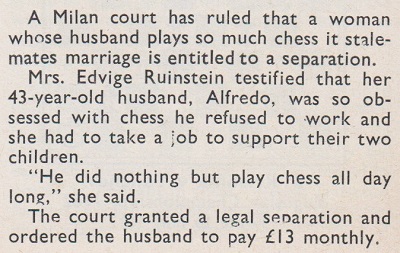
A number of English-language webpages cover/repeat the story, but where are the accounts in Italian sources?
(10843)
Luca Contini (Milan, Italy) sends a report from page 4 of the 12 April 1963 edition of the Corriere Milanese, the local insert in the national Corriere della Sera:
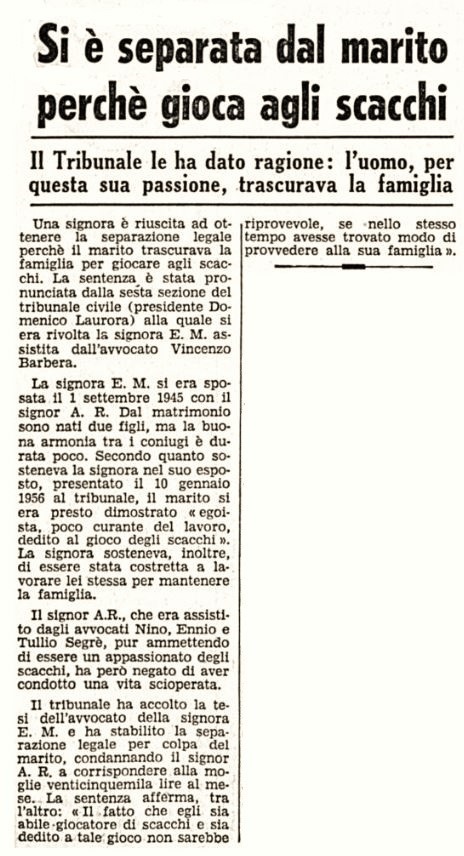
The English-language reports (see C.N. 10843) improbably gave the surname as ‘Ruinstein’. Information about Alfred(o) Rubinstein of Milan can be found on-line, and he was mentioned on page 338 of Storia degli Scacchi in Italia by A. Chicco and A. Rosino (Venice, 1990):
‘Dal 16 al 25 maggio del 1949, 34 giocatori diedero vita alla “Selezione nazionale” di Bologna, vinta da due stranieri residenti in Italia: il milanese Alfred Rubinstein e il romano Nicola Engalicew.’
(10848)
1987: books on a Kasparov v Short match
An extract from C.N. 1387, written in 1987 (see Rebuttals):
The BCM is even capable of dropping a news story half way through if it looks likely to show Mr Keene in unfavourable light. The most recent example concerns a court writ (behind which was Raymond Keene and Thames Television) issued in February against Aly Amin of Chequers. Mr Amin was prevented by the subsequent High Court hearing from bringing out a book on the Kasparov-Short speed chess event until the recordings of all six games had been shown on television. One can appreciate the reasoning behind such a restriction, which aimed to ensure that the suspense of the match was not spoiled for viewers. The BCM clearly considered the story an important one, even discussing it in its March editorial. Its April issue quoted a Thames Television spokesman’s comment on the High Court verdict: ‘This is a significant victory which safeguards delayed transmission of chess on television and will enable us to explore future similar projects’. So far, so good. But on 16 March Mr Keene’s own book on the match was rushed out early. At that time two games had still not been screened, and viewers’ interest was therefore well and truly spoiled – by the very parties who had used the courts to stop Aly Amin from doing the same. So did the fearless BCM draw attention to this hypocrisy? Not at all. The May issue (page 194) reviewed the Keene book – uncritically, of course – but the legal dispute, extensively reported up until then, was quietly dropped.
Roger Lancaster of Chequers, London sends us a copy of a letter written by him to news flash giving further details of the legal dispute regarding books on the Kasparov v Short match. Since the full text is published on page 10 of the 10 July 1987 news flash we give just a brief summary here. On 10 February M.J. Feldman, a Thames Television producer, made an affidavit: “... it was critical that the results and in particular the moves made by the players were not published until each game had been transmitted in order not to spoil the viewers’ interest and enjoyment of the programmes. ... In an accompanying affidavit, Raymond Keene swore that he agreed with Mr Feldman’s statement. However, a copy of Mr Keene’s Batsford/Thames book was in the hands of Chequers’ solicitors when only three of the six match-games had been transmitted. Mr Lancaster puts the central point very well:
‘It will be interesting to know, and indeed the High Court may wish to know, how Messrs Feldman and Keene reasoned that a book written by an outside party would “spoil the viewers’ interest and enjoyment” while a book co-produced by Thames Television and written by Keene would not.’
(1452)
Wanted: specific information on how the court case ended.
Other cases referred to in C.N. are as follows:
Concerning litigation arising from the 1961 Reshevsky v Fischer match, see C.N. 11169. As regards other legal affairs, see Brad Darrach and the Dark Side of Bobby Fischer.
A wide-ranging article is ‘Chess Lawsuits’ on pages 264-266 of Chess World, December 1957.
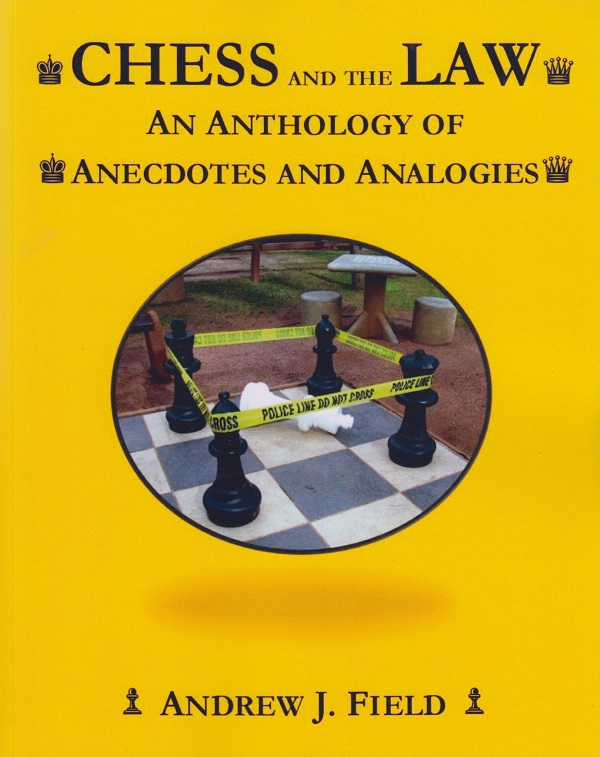
The hundreds of entries in Chess and the Law An Anthology of Anecdotes and Analogies by Andrew J. Field (‘Amazon Fulfillment’, Wrocław, 2019) range from a brief paragraph on a minor court-case to four pages on Norman Tweed Whitaker and nine on William Henry Russ. An unnumbered introductory page states that the book ‘surveys the many interesting and unusual ways that the game of chess has intersected with the practice of law in the United States’ and warns that ‘this book is not appropriate for children’. Many violent cases are discussed.
(11681)
C.N. 2443 called Shady Side: The Life and Crimes of Norman Tweed Whitaker, Chessmaster by John S. Hilbert (Yorklyn, 2000) ‘an enthralling romp through tournament halls, court rooms and prison cells’.
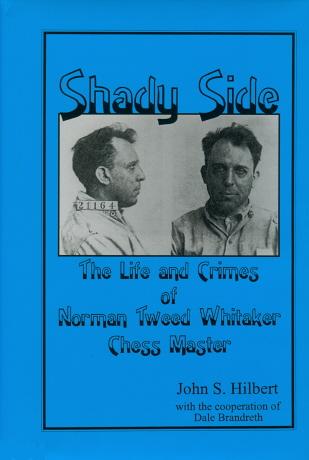
Concerning Flesch v Barcza, see C.N. 5941.
An endnote on page 262 of Chess Explorations:
Page 3 of the 7 February 1994 Inside Chess recorded the legal outcome of the unauthorized copying by Raymond Keene (in The Complete Book of Gambits) of John Donaldson’s analysis of the Lisitsin Gambit.
See Copying.
See too The Mysterious Frederick D. Rosebault.
Latest update: 30 April 2025.
To the Chess Notes main page.
To the Archives for other feature articles.
Copyright: Edward Winter. All rights reserved.